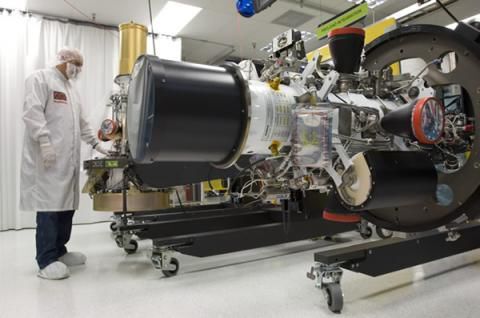Raytheon Technologies Corp. posted better-than-expected third quarter earnings on the strength of its defense businesses, including Tucson-based Raytheon Missiles & Defense.
But Raytheon shares tumbled Tuesday as the company’s commercial aviation units continued to struggle amid the COVID-19 pandemic.
The Waltham, Massachusetts, parent company posted third-quarter net income of $264 million, or 10 cents per share, not including income from discontinued operations.
The results included $721 million, or 48 cents per share, in special and one-time charges related to the merger of United Technologies Corp. and Raytheon Co. that formed Raytheon Technologies in April, and accounting for the impact of the pandemic on its commercial aviation businesses.
On an adjusted basis, Raytheon posted third-quarter earnings of 58 cents per share on revenues of $15 billion.
The adjusted earnings beat the average analyst estimate of 48 cents per share, according to Zacks Investment Research, but Raytheon shares fell more than 7%, to 56.44, in trading on the New York Stock Exchange.
The Tucson-based Missiles & Defense unit posted third-quarter sales of $3.8 billion and an operating profit of $453 million.
The parent company said it cut costs by $700 million and conserved $1.9 billion of cash in the third quarter ended Sept. 30.
Raytheon has laid off nearly 20,000 full-time and contract employees in its commercial aerospace subsidiaries, jet-engine maker Pratt & Whitney and Collins Aerospace, which makes an array of aircraft components.
Third-quarter sales fell 34% at both Pratt & Whitney and Collins, and Pratt & Whitney posted a quarterly operating loss of $615 million, or an adjusted $43 million.
Raytheon Technologies CEO Greg Hayes said the company continues to serve its customers taking the necessary actions to weather the current environment and emerge as a stronger business,.
“The long-term business fundamentals and earnings power of Raytheon Technologies remain strong with our balanced portfolio, leading businesses and advanced technologies that combine the best of commercial aerospace and defense,” Hayes said.
Major defense-related sales in the third quarter included $186 million booked for an advance radar for the Kingdom of Saudi Arabia by Raytheon Missiles & Defense and $928 million for classified programs at Raytheon Intelligence and Information Systems.
Pratt & Whitney booked $473 million for engines used on the next-generation F-35 multirole fighter jet, while Collins had a $320 million award for services and upgrades for NASA’s Extra Vehicular Activity — spacewalking — programs on the International Space Station.
Raytheon reported a “robust” backlog of $70 billion for defense-related work and an $82 billion backlog of commercial aerospace contracts.





